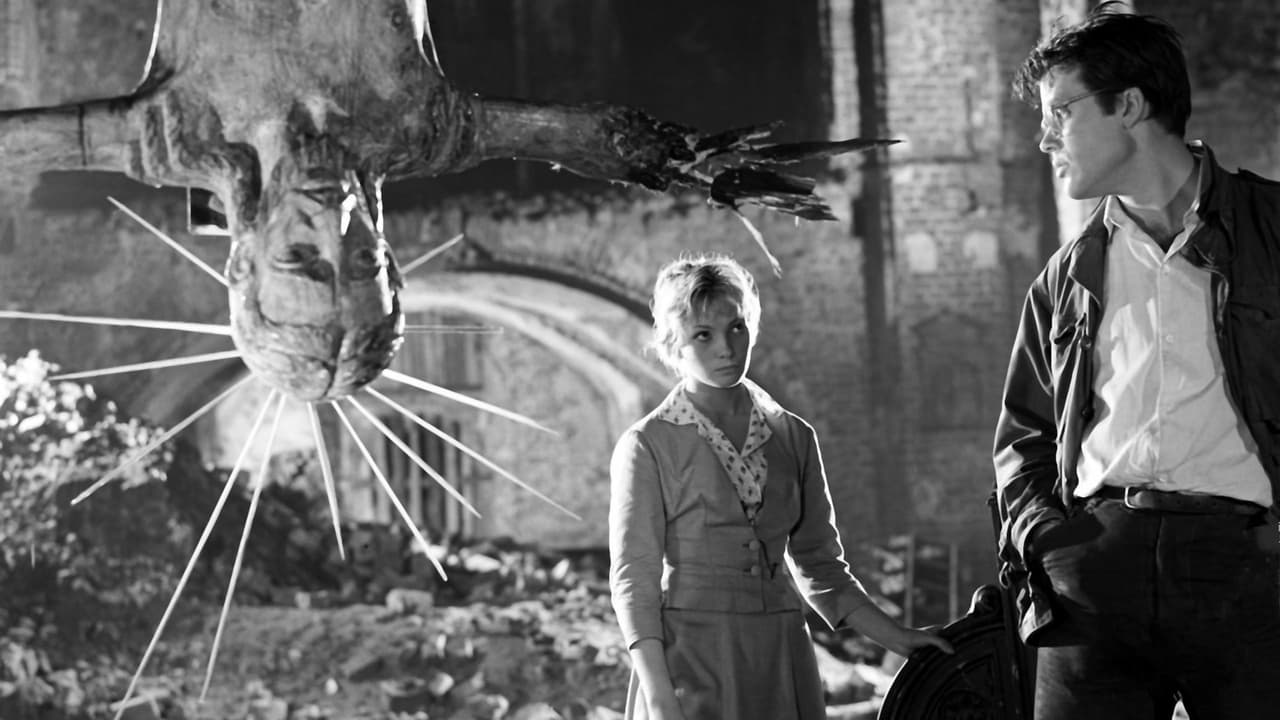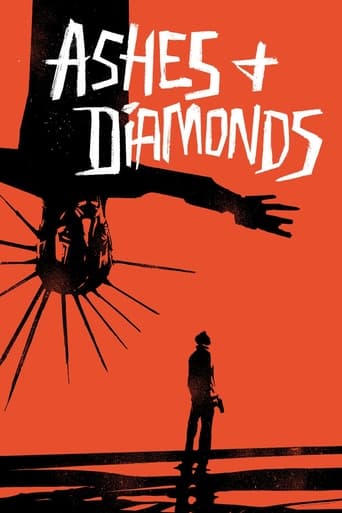

It's the end of WWII. Poland has a mix of resistant fighters. With the flood of Soviet troops, the communists are taking over. Maciek (Zbigniew Cybulski) and Andrzej are assigned to kill a local communist leader Szczuka. They mistakenly kill a couple of cement workers instead. Fellow fighters are being rounded up and killed. Maciek is conflicted and falls for beautiful bartender Krystyna.Zbigniew Cybulski wearing the sunglasses has the flair of James Dean. He's the most compelling character in a sea of less compelling characters. I would have liked to stay with him 100% of the time. I'm also unsure about whether James Dean fits in an espionage thriller. That's why I would like to concentrate on his inner struggles and his romance with Krystyna. Zbigniew creates a memorable character in a chaotic world.
... View MoreWith WW2 ending, Poland finds itself in a period of transition and transformation. Millions have been uprooted, the country's infrastructure is in ruins, and there is uncertainty as to whether Russian Communists will move in to occupy the vacuum left by the departing Germans. Enter Maciek, a gunman who works for an anti-Communist faction. He's been tasked with assassinating Polish politicians sympathetic to the local communist party, which is what Andrzej Wajda's "Ashes and Diamonds" finds Maciek doing when it opens. His mission complete, Maciek then disappears to a neighbouring town, eager to learn his next assignment. What he learns, however, is something else: he's assassinated the wrong target. The rest of the film finds Maciek struggling to rationalise the killing of his fellow countrymen. The film's title encapsulates Poland's twin possibilities: destruction or prosperity. Maciek will not accept that the latter necessitates the former.The film plays like a pessimistic, very Eastern European take on "Cassablanca", most of the action taking place in bars, restaurants, shadows and over tables. This is a world rife with spies, communists, anti-communists, double-dealers, mercenaries, power vacuums, red herrings and characters who's loyalties constantly shift. Maciek's no Bogart, though. No cocksure American. He's a confused kid straight out of a 1970s Godard or Fassbinder movie, complete with big sunglasses and a part-time job as a terrorist. Hilariously, Maciek seems to never take off his sunglasses: his world is perpetually pitch black.The film's aesthetic, heavy with a type of symbolism typical of Wajda (upside down Christs, white horses which foreshadow Wajda's "Lotna" etc), tries to capture Maciek's own stormy, crisis of conscience. It's a noirish dark night of the soul. World War 2 has ended, Poland has survived, and yet why does she now find herself again at war? Why now are Poles killing Poles? How can Maciek justify killing his fellowmen? Today such moral dilemmas, as well as killing itself, has long been banalized down to nothingness. It's not that man no longer cares; man cares but does "it" anyway. The film ends with Maciek's own death, his blood stains forming the Polish flag, his body melting away into a field of garbage.Like many of Andrzej Wajda's films during this period, "Ashes and Diamonds" was a giant exercise in smuggling the artist's own political views past state censors. After WW2, Stalin created a communist, Soviet allied Polish state, officially dubbed "The People's Republic of Poland". As a part of the Eastern bloc, works of art in Poland deemed "oppositional" to both the Soviet Union and communism were firmly stamped out. And yet many of Wajda's films - though they tend to do this in a somewhat vague, elliptical way - are heavily critical of Polish politics and his local government's ties with the Soviet Union. Some authors have speculated that Poland's love for rebel archetypes and resistance fighters – local characters mythologised during WW2 - blinded censors to the "Ashes and Diamonds'" overall point: idiots, we're killing ourselves for Uncle Stalin!8.5/10 – "Ashes and Diamonds" is customarily thought of as being the second film in Wajda's "War Trilogy". The other films include "Kanal" (1957) and "A Generation" (1955). Worth two viewings.
... View MoreAt its most basic, Andrzej Wajda's "Popiol i diament" (called "Ashes and Diamonds" in English) may seem to be a look at where Poland would be going after WWII ended. The plot involves young Maciek Chelmicki (Zbigniew Cybulski), who has helped expel the Nazis from Poland. With the Soviet Union now taking over the country, he is ordered to shift his allegiance to them. Through Maciek's acquaintances with communist leader Szczuka and barmaid Krzystyna (Ewa Krzyzewska), a potentially explosive situation arises.If you know nothing about how the movie got made, this seems to be the whole purpose. But there are other points. In a mini-documentary about the movie, Andrzej Wajda and his collaborators explain how the novel on which the movie is based had Szczuka as the main character. Wajda not only moved the focus to Maciek - and gave him sort of a James Dean look - but also stressed the scene where Maciek talks with the man who fought in the Spanish Civil War. Apparently, fighting like the man did is a Polish tradition. Therefore, the film likely appeals to the Poles in almost every way; the perfect Polish movie, if you will.Although I've never seen any of Andrzej Wajda's other movies - hell, I'd never heard of him until the Academy Awards gave him an honorary Oscar - I staunchly recommend this one. One can clearly see how he used the movie to subtly challenge the Soviet domination of his country (of course, they couldn't openly say anything against the USSR). Poland's pro-Soviet government had approved the movie, but didn't want to let it outside Poland. Wajda got some people to smuggle it out of the country, and it reached much of the world. Probably the most amazing scene is the end. I won't spoil the end, but I'll note that blood on a white sheet looks a bit like Poland's flag (a nationalistic statement).All in all, a great movie. Andrzej Wajda has every reason to be proud of it.
... View MoreWhen Germany surrendered in WWII on May 8, 1945 there was much celebration in the West, but the mood in Poland was not altogether jubilant - the Nazis had been defeated but the Soviet occupation was settling in for a long stay. The complexity of the political situation is reflected in this film but, short of having been there or studied the history, an encompassing understanding of the chaotic situation must remain incomplete I think. However, this film is a great example of how focusing on the lives of a few characters in a single twenty-four hour period can illuminate significant historical facts in the context of an intriguing story.The characters are representative of the factions existing in Poland on the day of the German surrender. You have: Maciek, a resistance fighter who had opposed the Germans and was continuing the struggle against the communists; Szczuka, a Pole who embraced the communists and had become a party official; Drewnowski, whose sympathies were with the resistance, but who hedged his bets by playing on both sides; people sucking up to the new power structure for purely personal gain; and most folks, who were just trying to get by.Moral ambiguities abound, raising issues with no easy answers. In an attempt to kill Szczuka Maciek mistakenly kills two innocent workers returning from a day of work at a local cement plant. Is continued resistance worth the sacrifice of innocent Polish lives? Maciek is conflicted about this and when Maciek's superior officer asks his superior if it is really necessary to kill Szczuka, he gets a resounding "Yes," followed by the question, "Is this the Poland you fought for?" Ordinary citizens bemoan the fact that any killing of Poles by Poles is wrong, but the very existence of the resistance shows that there is no universal agreement on that. Though Szczuka may be on the wrong side, he is not played as a villain and in fact he seems sincere in his convictions. You believe there is no evil intent when he says, "The end of the War isn't the end of our fight. The fight for Poland and what kind of country it is to become has just begun." Having met and become infatuated with the beautiful Krystyna, Maciek is torn between giving up on the resistance and pursuing personal goals. But his superior officer's implication that to do so would be traitorous to the cause resonates with him and, when he has an opportunity to kill Szczuka, he casts his lot with the cause he has fought for - a cause he knows is probably doomed, and will doom him. Better to die for a doomed cause you believe in than live a lie? Or, is it better to work within the system in trying to achieve heretical ideals?Zbigniew Cybulski is a quirky but charismatic actor. His unexpected facial expressions and body movements create a unique, memorable character. All the actors are good, and the melancholy score is perfect for the mood of the film - it is reminiscent of some of the more plaintive works of Nina Rota.A most impressive aspect of this film is the black and white cinematography. Every scene is artistically composed and there are many scenes that achieve a stunning effect, such as the one between Maciek and Krystyna in the ruined church with a life-sized crucifix hanging upside down and swaying to the sound of an eerie squeak, perhaps suggesting that the church had been turned on its head, or otherwise marginalized. The initial scenes also suggest the impotence of religion during this difficult time. When one of the innocent workers tries to escape Maciek's shots, he seeks refuge in a church, but the door is locked. After the door jam has been blown off the worker falls through the doorway, revealing a mangled crucifix inside.This film encourages one to do a little study of Polish history. Poland lost over five million civilians in the war, about three million of them Jews. This out of a population of thirty-five million. Poland also lost over 400,000 military personnel fighting for the allies, about the same number that the United States lost. Total U.S. casualties during the war accounted for about a third of one per cent of the total population, compared with a 16% loss of the Polish population. And, in the end, what Poland got for its sacrifice was a fifty year period of Soviet occupation. The segment of Norwid's poem that Maciek recites, "Will only ashes remain, and chaos, whirling into the void, or will the ashes hold the glory of a starlight diamond?" is particularly poignant in view of what happened.This film is in a league with the best black and white films of Bergman and Fellini.
... View More